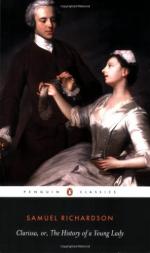I’ll tell thee how I play’d him off.
He came in his own chariot to Dormer’s; and we took a turn in the garden, at his request. He was devilish ceremonious, and made a bushel of apologies for the freedom he was going to take: and, after half a hundred hums and haws, told me, that he came—that he came—to wait on me—at the request of dear Miss Howe, on the account—on the account—of Miss Harlowe.
Well, Sir, speak on, said I: but give me leave to say, that if your book be as long as your preface, it will take up a week to read it.
This was pretty rough, thou’lt say: but there’s nothing like balking these formalities at first. When they are put out of their road, they are filled with doubts of themselves, and can never get into it again: so that an honest fellow, impertinently attacked, as I was, has all the game in his own hand quite through the conference.
He stroked his chin, and hardly knew what to say. At last, after parenthesis within parenthesis, apologizing for apologies, in imitation, I suppose, of Swift’s digression in praise of digressions—I presume—I presume, Sir, you were privy to the visit made to Miss Howe by the young Ladies your cousins, in the name of Lord M., and Lady Sarah Sadleir, and Lady Betty Lawrance.
I was, Sir: and Miss Howe had a letter afterwards, signed by his Lordship and by those Ladies, and underwritten by myself. Have you seen it, Sir?
I can’t say but I have. It is the principal cause of this visit: for Miss Howe thinks your part of it is written with such an air of levity— pardon me, Sir—that she knows not whether you are in earnest or not, in your address to her for her interest to her friend.*
* See Mr. Lovelace’s billet to Miss Howe, Letter XIV. of this volume.
Will Miss Howe permit me to explain myself in person to her, Mr. Hickman?
O Sir, by no means. Miss Howe, I am sure, would not give you that trouble.
I should not think it a trouble. I will most readily attend you, Sir, to Miss Howe, and satisfy her in all her scruples. Come, Sir, I will wait upon you now. You have a chariot. Are alone. We can talk as we ride.
He hesitated, wriggled, winced, stroked his ruffles, set his wig, and pulled his neckcloth, which was long enough for a bib.—I am not going directly back to Miss Howe, Sir. It will be as well if you will be so good as to satisfy Miss Howe by me.
What is it she scruples, Mr. Hickman?
Why, Sir, Miss Howe observes, that in your part of the letter, you say— but let me see, Sir—I have a copy of what you wrote, [pulling it out,] will you give me leave, Sir?—Thus you begin—Dear Miss Howe—
No offence, I hope, Mr. Hickman?
None in the least, Sir!—None at all, Sir!—Taking aim, as it were, to read.
Do you use spectacles, Mr. Hickman?
Spectacles, Sir! His whole broad face lifted up at me: Spectacles!—What makes you ask me such a question? such a young man as I use spectacles, Sir!—




